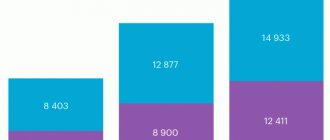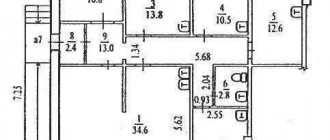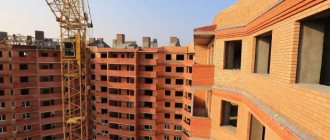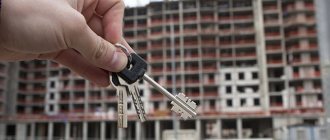Participation in shared construction has now become a common way to solve the housing problem. This allows citizens to get an apartment at a favorable price, and developers to develop the market for new buildings. Additional guarantees are provided by registering a shared construction agreement, which will not allow scammers to repeatedly resell the same apartment during the construction of the house.
It would seem that the scheme was successful for everyone, in fact, it made some hostage to the situation when developers went bankrupt, the deadlines for putting houses into operation were significantly delayed, and they even became abandoned at an unfinished stage.
More and more defrauded shareholders began to appear, and their discontent spilled into the streets with pickets at local administrations. It was necessary to make adjustments to the current legislation. And they began to operate on January 1, 2021 in terms of openness of information about the developer, entering this data into the Unified Housing Construction System and bankruptcy rules. The new part of the amendments was introduced on July 1, 2021 by Federal Law No. 175 and we will talk about them in more detail.
Federal Law on Shared Construction 214-FZ
The main regulatory document in the field of regulating relations between developers and citizens is the Federal Law of December 30, 2004 No. 214-FZ “On participation in shared construction.” Amendments are made annually in order to solve problems associated with the emergence of defrauded shareholders.
The reasons for the occurrence of such situations, as a rule, are fraudulent construction financing schemes, when financial holes formed at other sites are “plugged” with the funds of new investors. As a result, cases may occur when the developer is unable to fulfill its obligations and declares itself bankrupt. In the worst case, he simply disappears.
In order to prevent fraudulent schemes, serious amendments have been made to the law, which will come into force on July 1, 2021.
Shared construction in 2021. New in legislation
Innovations in Law 214-FZ have tightened the requirements for construction organizations constructing apartment buildings under public participation agreements. Let's list them:
1.One developer – one building permit.
On July 1, 2021, an amendment came into effect that does not allow a specialized developer to build apartment buildings under multiple permits. A permit may be issued for one or more construction projects, but only one.
2. The requirements for a construction company have changed.
The permit will be issued only if the developer meets the following parameters:
- the company has its own funds in the amount of at least 10% of the planned construction volume according to the project documentation;
- the sufficient size and availability of these funds in the developer’s current account must be documented at the time of submission of the project declaration to the territorial authority;
- the company does not have the right to issue and issue securities other than shares;
- the developer should not have debt on targeted loans and credits, if they do not relate to the construction of an apartment building under the same permit;
- the company's property should not be used to fulfill obligations to third parties;
- The developer must have successful projects of at least 5 thousand square meters;
- the developer is prohibited from engaging in activities other than construction.
According to Article 23.3 of Federal Law 214-FZ, the list of data that the developer is obliged to place in the Unified Information System for Housing Construction has been supplemented with title documents for the land where the construction of a residential building is being carried out.
3.One developer – one current account.
A construction organization that is a specialized developer is allowed to have only one current account opened with an authorized bank. Thus, funds not only from the developer and buyers, but also from a bank accredited by the state can participate in the construction of a residential property.
All monetary transactions on this account must be only within the framework of 214 of the Law, but also under the control of the bank. Funds can be written off if the developer submits supporting documents and has them verified by the credit institution. Thus, the funds will not be transferred to the builders until they fulfill their obligations to the shareholders.
4. Funds from private individuals can be raised through escrow accounts (Article 15.4 of the Federal Law of December 30, 2004 No. 214-FZ).
This method makes it possible to insure the funds of shareholders, but only when depositing them into an escrow account. Insurance is provided by the Deposit Insurance Association or the compensation fund.
5.Transactions must be accompanied by a bank.
6.State control of transactions.
Supervisory bodies should be created in each subject, which, together with banks, will exercise control over developers. The heads of such bodies are appointed by the Ministry of Construction (Article 23 of the Federal Law of December 30, 2004 No. 214-FZ).
7. Contributions to the compensation fund
In order to guarantee compensation for the lost funds of investors as a result of the developer’s dishonesty, a Fund for the Protection of Shareholders is being formed. The law obliges the construction company to transfer to it 1.2% of the proceeds from the sale of the housing of prisoners under pre-trial detention. Agreements will not be registered without the developer transferring funds to the Fund.
8. The amount of advance payments is limited
The new version of the Law establishes the condition for the transfer of funds by the developer as settlements with suppliers and contractors. Without presenting the bank with documents confirming the obligations fulfilled under the contract, the money will not be transferred. This means that only after the partner fulfills the conditions for the provision of services, delivery of goods, etc. the developer will be able to pay him.
But in Part 4 of Article 18 of the Law there is a clause that advances may be transferred to partners, the total amount of which will not exceed 30% of the declared cost of the project.
9. The plot of land on which the apartment building will be built must be owned by the developer or leased.
How to choose a bona fide developer
It would seem that the opportunity to “get right” with the developer is close to chance. However, professional real estate agencies successfully check developers in the same way as checking the “legal purity” of apartments on the secondary market. The only difference is that in the case of checking a new building, several other factors are subject to verification. This is one of the reasons why the belief that you don’t need an agency to buy a new home is a common misconception. However, to the extent possible, an “independent” investor can also try to replicate the professional experience of realtors.
What documents should the developer have?
First of all, it is necessary to check the project declaration, which the developer is obliged to provide upon request. This document contains information about the activities of the developer and the construction of the facility in which the future investor plans to purchase an apartment. In addition, the most important information in the project declaration is information about other objects, the construction of which was carried out by the developer over the past 3 years. The project declaration publishes the location of these objects, the timing of commissioning and the compliance of the developer’s activities with the obligations assumed. In addition, the project declaration contains information about the financial condition of the developer and his current debts. By reading this document, you can get a fairly clear idea of the reliability of the construction company.
No less important is information about the object of future investment: deadlines for completing the stages and putting the house into operation, information about non-residential premises, the total cost of construction, insurance and other ways in which the developer can guarantee the security of the transaction for the investor.
Information about the developer
In addition to the project declaration, it is important to study other information. These include the relevance of information about the registration of a legal entity in the Unified State Register of Legal Entities, clarification of information about the financial condition and possible risks of bankruptcy proceedings, and lawsuits involving this company.
It doesn’t hurt to conduct your own “investigation” - talk to the residents of the completed buildings, if there are any, and study reviews of the developer’s other properties. If those who decided to participate in shared construction before you identified the pitfalls of investing in this developer, information about this will definitely appear. If, in general, the information background is favorable and the bulk of the data obtained testifies in favor of the developer, possible one-time negative reviews should not be embarrassing - dissatisfied people are everywhere. However, the entire check must be carried out carefully.
Cost of square meters
As a rule, for reliable developers the cost per square meter is approximately the same and the fluctuations are insignificant. If the offer price is incredibly low or you are offered a large discount (30% or more) if the contract is signed as soon as possible, these facts should alert you. If the legitimate benefit of the developer in such proposals is not obvious to you, perhaps this particular developer is preparing to declare bankruptcy immediately after collecting the desired amount from investors.
Developer partners
One of the informative (although not always guaranteed) ways to ensure the reliability of a construction company is its partners. Reputable developers who have been working for many years and have a well-deserved reputation usually have an impressive list of partners. If they include serious suppliers of equipment and materials, well-known insurance companies, funds and banks with a high reliability rating, this gives the company the right to trust investors. However, it is important to remember that even among very well-known developers who have had an excellent reputation in the past and partnerships with very respected companies, there are those whose performance results provoke claims and lawsuits from investors much more often than they generate grateful reviews.
Will shared construction be canceled on July 1, 2021?
Changes to Law No. 214-FZ on shared construction led to the abolition of the existing scheme and a smooth transition to project financing of housing construction.
For developers, projects started earlier than July 1, 2021 must be completed under the same conditions, and for buyers with concluded and registered DDUs will remain in effect until the housing is delivered.
Transition period from shared construction to project financing
The transition is carried out in two stages:
1. The period from July 1, 2021 to June 30, 2021, when developers enter into contracts with citizens using one of the mechanisms:
- escrow accounts;
- state regulation in accordance with Art. 23 No. 214-FZ.
2. The period from July 1, 2021 to December 31, 2021, when all agreements on the shared participation of citizens in housing construction will use the mechanism of escrow accounts or special accounts.
In 2021, a new financing model will lead to construction being carried out using bank loans. Citizens' funds stored in escrow accounts will be transferred to the developer or to repay the loan only after the signing of the transfer deed by the parties participating in the shared construction.
Essential points of the DDU
Many citizens tend to sign contracts “without looking,” especially if the document has a large amount of text, replete with legal terms and formulations that stretch thoughtful reading for more than one hour. But it is necessary to carefully read the DDU and clarify all unclear questions before signing in order to secure your own transaction.
Important! Care when signing a DDU is an important component of the security of the interests of the shareholder. Therefore, a sufficient amount of time must be allocated for the trip to the property manager’s office to study and sign documents.
What you need to pay special attention to in the share participation agreement:
- Shared construction facility. The developer must provide all project documentation, construction address, series of residential building, its number of floors and the floor of the apartment being purchased, its area and layout.
- Cost and payment procedure - one time or in several stages; rights and obligations of the parties.
- Deadlines. A period is determined after which the house must be put into operation, the apartments must be registered in the cadastral register and registered in the name of the new owners. The developer also undertakes to provide investors with information about the progress of work during the construction process through open publication of reports.
- Responsibility of the parties in case of violation of obligations under the contract.
It is important that all information in the contract that is subject to verification is true, and all questions that are not completely clear to the investor are clarified before signing, or even better, before visiting the sales office.
Banking support for transactions in shared-equity construction
Banking support for transactions has become mandatory since 2021. Now citizens will not be able to transfer funds directly to the developer under a DDU agreement. The state obliges them to be deposited into a special account in a bank opened as part of a construction permit. Those projects that started earlier than the specified date are required to switch to the same system of calculations and control over them.
As part of the comprehensive development of the territory, the developer is allowed to build apartment buildings under several permits, but for each of them he must open his own bank account.
Such regulation of financial relations between shareholders and developers makes it possible to insure citizens’ funds against losses due to fraud or bankruptcy of the developer.
Funds will be received only if:
- putting the house into operation;
- registration of ownership of at least one of the apartments in it.
In case of freezing of the object or bankruptcy of the developer, all funds of the shareholders will be returned to them in full.
Escrow account for a developer
From July 1, 2021, the developer is required to open escrow accounts when concluding DDU agreements. It is planned that such a model will reduce the risks of shareholders being defrauded.
Thus, the new mechanism will lead to the fact that there will be no need to conclude agreements with citizens participating in shared-equity construction. These funds will be held in special accounts of the developer under the control of the credit institution and insured by the Deposit Insurance Agency against possible bank bankruptcy.
The amount of insurance compensation in this case is 10 million rubles per apartment in an apartment building.
The set of conditions that are applicable under the new legislation to the construction of apartment buildings makes it possible to draw the following conclusions:
- equity participation agreements in construction will no longer be used, a transition to project financing has occurred;
- previously concluded agreements will be valid until the obligations under them are fulfilled;
- The cost of apartments in new buildings is expected to increase due to new requirements for construction financing; now it will be difficult to buy at low prices at the “pit” stage.
What requirements does the law impose on developers?
Only those construction companies that operate within the framework of the law and fully comply with the requirements of the law can raise money. The developer must:
- have sufficient financial resources available (minimum 2.5 million);
- be a bona fide participant in public procurement and not be on any lists of unreliable suppliers;
- do not have tax debt of more than 25% of your assets;
- it should not be subject to liquidation or bankruptcy proceedings.
The developer must have a construction permit in hand, and a project declaration for the facility being built must also be published on its official website. Only after this the developer has the right to conclude deals and attract investments.
Even before signing the contract, the developer is obliged to insure its liability to each participant. He must have insurance or a surety agreement, and the developer may also be a member of a mutual insurance company.
For projects that began operating on January 1, 2021, a new way to ensure the responsibility of developers has been introduced - contributions to the compensation fund from each concluded DDU.









